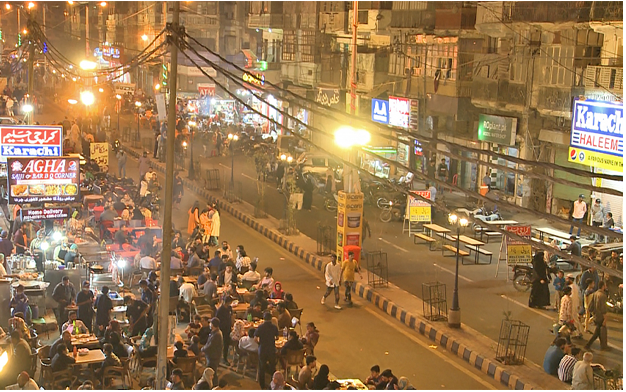i INP-WEALTHPK
Ahmed Khan Malik
Karachi’s food business is thriving as the city’s food streets continue to attract crowds from across Pakistan and abroad, but store owners complain poor infrastructure is holding back their full potential. Over the past decade, Karachi’s food culture has evolved from traditional dhabas and roadside stalls to a vibrant mix of heritage eateries, trendy cafés, and international franchises.

Food hubs such as Boat Basin, Do Darya, Hussainabad, and Burns Road have emerged as bustling night-time economies, generating thousands of jobs and providing affordable leisure options for families. According to local trade bodies, the sector brings in millions of rupees in daily sales and serves as a major draw for domestic tourism.
However, the city’s food streets face persistent infrastructure challenges. Narrow, congested roads make parking a constant headache for visitors. Inadequate street lighting in some areas raises safety concerns, while open drains and poor waste collection undermine hygiene standards.
“We invest in décor, quality, and service, but the surroundings don’t match the experience,” said Idris Rajput, a Boat Basin restaurant owner. “If the government upgrades the streetscape, our business could grow twofold.” Business owners and food associations are calling for dedicated parking zones, regular road maintenance, underground drainage, reliable street lighting, and modern waste disposal systems.
At Burns Road, where heritage buildings line the busy street, restaurateurs are also pushing for preservation and beautification initiatives to enhance its appeal. Mustafa Razai, a Burns Road food outlet owner, recalled that a facelift in 2021—with wider pedestrian areas and better lighting—briefly boosted sales and footfall. “Initial efforts were great, but without long-term upkeep, we’re back to square one,” he said, noting that garbage piles and encroachments have returned.
He stressed that well-designed and maintained food streets can become powerful urban assets. “They don’t just feed people; they create identity and community,” he remarked. For many vendors and restaurant staff, better infrastructure means more than higher sales—it means stability. In Hussainabad, small-scale vendors say waterlogging during the monsoon season can halt business for days, causing severe income losses.
Despite these obstacles, Karachi’s food businesses remain resilient, driven by the city’s strong eating-out culture. Nooruddin, a restaurant owner in Hussainabad, said many businesses are investing in innovative menus, social media marketing, and home delivery to diversify income streams. “But without government intervention on infrastructure, the sector’s full potential will remain untapped,” he warned.
Karachi Metropolitan Corporation (KMC) officials acknowledge the food sector’s importance but cite funding constraints and competing priorities. Nizam Siddiqui, a KMC official, said the city is exploring public-private partnerships for sustainable food street development, including revenue-sharing models in which part of the earnings from vendors and parking fees would be reinvested in upkeep.
Credit: INP-WealthPk


